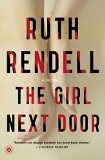Summary | Excerpt | Reading Guide | Reviews | Beyond the Book | Readalikes | Genres & Themes | Author Bio

Critics' Opinion:
Readers' Opinion:
First Published:
Oct 2014, 288 pages
Paperback:
Jul 2015, 304 pages
 Book Reviewed by:
Book Reviewed by:
Donna Chavez
Buy This Book
Woody was free. But was he? Not while the bodies lay under the firewood in the summerhouse. He was actually contemplating them from the summerhouse doorway when Mrs. Mopp came down the garden to tell him a police officer was at the door asking to see him. Woody shut the summerhouse door and locked it. Not one policeman this time but two. His wife was seriously ill, he said, and he was going up to Yorkshire later that day to join her. They seemed to accept that but made no answer when he asked them, inwardly trembling, what made them ask.
Not while he had the white hand and the brown hand in the biscuit tin. The latter was easily disposed of, secreted in a place where only he could find it when the time came to contemplate those hands again, to remind himself. Since he had driven that bunch of kids out, none had returned, and now it was winter, too cold and wet for visiting the tunnels. One cold, wet evening, pitch-dark in November, he had shone his torch down the steps into the tunnels and followed its beam of light, carrying the biscuit box. In spite of the tarpaulin covering, the whole place was growing waterlogged, the only sound the slow, steady dripping of water onto water. He must be careful. It would be a fine thing if he slipped and fell and, with those hands in his hands, had to shout for help. Would he ever be found?
Woody stood still, thinking, staring down a deep hole, from which the yellowish, clay-thickened water seemed to be draining away. He could hardly see its bottom, only knowing that down there the liquid was finding a way out. Resting the torch on the lip of the hole, he squatted down and slid the tin over the edge. The light showed him that it had slipped down into the muddy wetness, then by its weight pushing aside some obstacle and disappearing from view. He got to his feet, slipped a little, knocking over the torch into the hole. The darkness was absolute. He turned round, telling himself to keep calm, not to panic, and struggled, foot placed carefully in front of foot, hands clutching at the tufts of rank grass that grew here and there from the clayey walls. A little light showed ahead of him, light from the moon it must be, because there were no streetlamps. He clambered up the slippery steps, sliding back once, then again, until at last—and by this time he could see the source of light, a full, round moon—he emerged onto the grass of the field. By the moonlight he could see that he was caked with mud, yellow filth, his hands and arms, his feet and trousers halfway up his thighs. No one was about. Few people ever were on these wartime evenings. And there was silence, not a light showing, not a note of music heard, not a word spoken, not a child's cry. As he opened the gate and let himself into his garden, he glanced at the Joneses' house next door, at the faint strand of light showing underneath the blackout curtain from what he thought might be Daphne's room. Lovely Daphne—if only she were a bit older and had money, she might become his next wife.
He let himself into the house by the back door, taking a look at the summerhouse from the doorstep. What a way out of his difficulty that would be, to get those bodies, the man's and the woman's, across the road and slide them down the hole as he had slid their hands. But impossible. He would be seen. He had no car, he couldn't drive. The idea must be given up, and the only way would be to destroy the bodies by fire before the police returned to search the place.
Only after the fire had burned the bodies and wrecked the garden did he realise he could never inherit Anita's money because as far as anyone knew she wasn't dead. Officially, to the police or the lawyers or her relatives, she could never die. There was no death certificate, no funeral, no will, no death notice. He looked at himself in the mirror and thought, My face is my fortune, always remember that. A headline in a newspaper told him that a direct hit had destroyed the police station in Woodford, which was only a few miles from Loughton. A lot of officers had been killed, and Woody wondered if this was why the police failed to come back. They had forgotten about him and let him alone. No one ever called him Woody again.
Excerpted from The Girl Next Door by Ruth Rendell. Copyright © 2014 by Ruth Rendell. Excerpted by permission of Scribner. All rights reserved. No part of this excerpt may be reproduced or reprinted without permission in writing from the publisher.





The House on Biscayne Bay
by Chanel Cleeton
As death stalks a gothic mansion in Miami, the lives of two women intertwine as the past and present collide.

The Flower Sisters
by Michelle Collins Anderson
From the new Fannie Flagg of the Ozarks, a richly-woven story of family, forgiveness, and reinvention.

The Funeral Cryer by Wenyan Lu
Debut novelist Wenyan Lu brings us this witty yet profound story about one woman's midlife reawakening in contemporary rural China.
Your guide toexceptional books
BookBrowse seeks out and recommends the best in contemporary fiction and nonfiction—books that not only engage and entertain but also deepen our understanding of ourselves and the world around us.